VIDEO TRANSCRIPT:
Andrew Fitch: Let’s dive right in! Today, or last time rather, we talked about microaggressions, we talked about the impact of unconscious bias. Let’s talk about mitigating unconscious bias by developing a culture of allyship within our organizations.
Starting off first with some terminology, these are some things that have to do with allyship.
First off is privilege. Privilege is an unearned advantage given by society to some people, but not all people.
Oppression: systemic pervasive inequality that is present throughout society that benefits those people with more privilege and harms those people with fewer privileges
Target: somebody who suffers from oppression.
Discrimination is the unjust or prejudicial treatment of different categories of people or things, especially on the grounds of race, sexual orientation, gender, identity, age, etc. What is an ally, an ally is a member of a social group that enjoys some privilege, who is doing things who is taking action, action, to work to end oppression, and to understand their own privilege.
And so it’s really important to note a couple of things about what I just said, first of all, somebody who enjoys some privilege and allies, somebody who enjoys some privilege, that’s not saying that it’s the most privileged person in the world or the most privileged person of all time, it’s just saying somebody who has some degree of privilege. So this could be pretty much anybody, depending on the circumstance.
Action is the second part that’s really worth noting here. You can’t just be an ally permanently. There’s no badge, there’s no certification, there’s no t-shirt that says allies on it, that makes somebody an ally. It’s a constant, everyday practice that is required to maintain an allyship sort of status. So one can myself included, by the way, act as an ally to somebody in the morning and say something pretty insensitive, maybe even unintentionally, but still insensitive, that same day so that’s what allyship is all about. It’s all about action.
Can you act as an ally? The answer is literally always yes, sometimes people have a little bit more privilege than others or different kinds of privilege than others. Sometimes somebody might be in a better position to act as an ally than others in a moment. But generally speaking, you may have some privilege on earned societal advantages. If you are some of these things you’re seeing on the slide right now, if you’re of the ethnic majority of the city or state or town in which you live, if you’re educated, if you’re not a mother, if you’re not a caregiver, if you are wealthy, wealth can be earned, but oftentimes isn’t earned, and so on and so forth. There are many other examples here too.
Why should allies take more action than targets? Because the stakes are higher for targets, especially when they try to take action on their own behalf. Oftentimes, unfortunately, even in the workplace, even in startups, if a target who has received a microaggression, let’s say, tries to take action and stick up for themselves, oftentimes, there could be more backlash against them as a result of it. If a bystander, an ally, steps in and tries to take action to mitigate the situation, it’s much more likely to be received positively and to maintain good relations in the office. So that’s why allyship is so important for our startups.
So some key takeaways: First of all, allyship, it’s all about action, you can’t just be an ally. Second of all, developing a culture of Allyship is critical to the success of our startups. If we want to maintain a culture where our employees feel welcomed, feel valued, feel encouraged to share their good ideas, and feel like they want to stay there for the long run.
We’re going to talk specifically about mitigating unconscious bias through anti-racism in this workshop.
So first of all, a couple of definitions:
Racism is prejudice, discrimination, or antagonism by an individual community or institution, against a person or people on the basis of their membership in a particular racial or ethnic group, typically one that is a minority or marginalized.
Four primary types of racism: individual racism, interpersonal racism, meaning between people, institutional racism, meaning within an organization, for example, a startup and structural racism, which is overarching societal racism
Anti-racism: No one is born racist or anti-racist these results from choices we make. So it’s about action. Being anti-racist results from a conscious decision to make frequent, consistent, equitable choices Daily. These choices require ongoing self-awareness and self-reflection as we move through life all of life. In the absence of making anti-racist choices. We unconsciously uphold aspects of white supremacy, of white-dominated culture and of equitable institutions and society.
Being racist or anti-racist, it’s not about who we are, it’s about what we do. So get back to that action. And now a quote from a famous author, “To be anti-racist is a radical choice in the face of history, requiring radical reorientation of our consciousness”. This is Ibram X Kendi.
Reminder: hopefully, you’re leaving with some key takeaways today: anti-racism is all about action. We can’t just be anti-racist. It’s an everyday process, and establishing a culture of anti-racism within organizations makes our organizations stronger and more successful.
Thank you for listening and watching I hope you folks have success moving forward!




